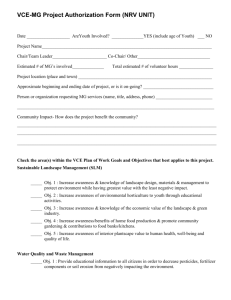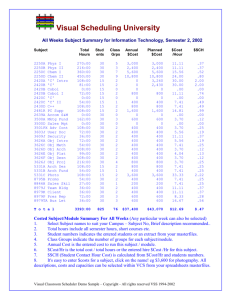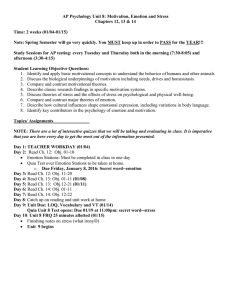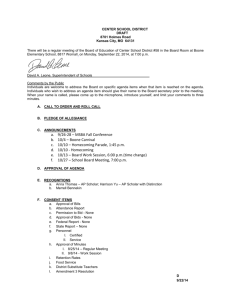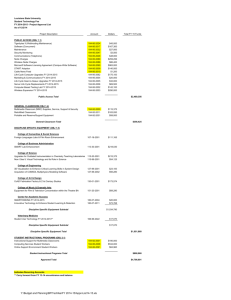TO: Joe Dieker FROM: Becki Elkins
advertisement
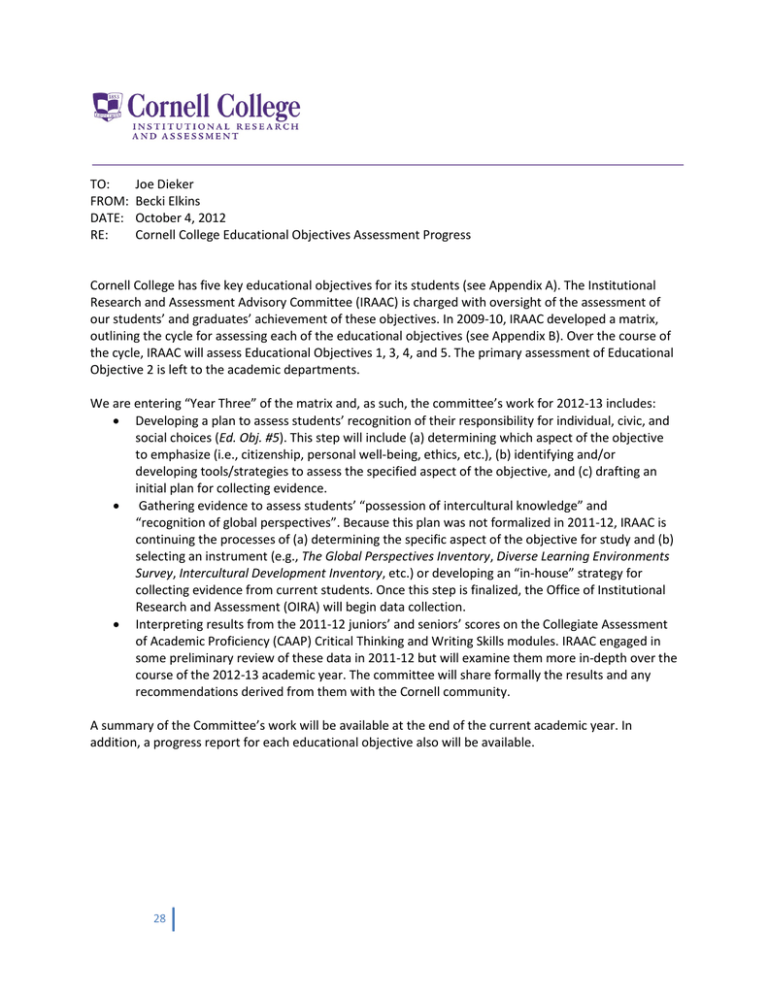
TO: FROM: DATE: RE: Joe Dieker Becki Elkins October 4, 2012 Cornell College Educational Objectives Assessment Progress Cornell College has five key educational objectives for its students (see Appendix A). The Institutional Research and Assessment Advisory Committee (IRAAC) is charged with oversight of the assessment of our students’ and graduates’ achievement of these objectives. In 2009-10, IRAAC developed a matrix, outlining the cycle for assessing each of the educational objectives (see Appendix B). Over the course of the cycle, IRAAC will assess Educational Objectives 1, 3, 4, and 5. The primary assessment of Educational Objective 2 is left to the academic departments. We are entering “Year Three” of the matrix and, as such, the committee’s work for 2012-13 includes: • Developing a plan to assess students’ recognition of their responsibility for individual, civic, and social choices (Ed. Obj. #5). This step will include (a) determining which aspect of the objective to emphasize (i.e., citizenship, personal well-being, ethics, etc.), (b) identifying and/or developing tools/strategies to assess the specified aspect of the objective, and (c) drafting an initial plan for collecting evidence. • Gathering evidence to assess students’ “possession of intercultural knowledge” and “recognition of global perspectives”. Because this plan was not formalized in 2011-12, IRAAC is continuing the processes of (a) determining the specific aspect of the objective for study and (b) selecting an instrument (e.g., The Global Perspectives Inventory, Diverse Learning Environments Survey, Intercultural Development Inventory, etc.) or developing an “in-house” strategy for collecting evidence from current students. Once this step is finalized, the Office of Institutional Research and Assessment (OIRA) will begin data collection. • Interpreting results from the 2011-12 juniors’ and seniors’ scores on the Collegiate Assessment of Academic Proficiency (CAAP) Critical Thinking and Writing Skills modules. IRAAC engaged in some preliminary review of these data in 2011-12 but will examine them more in-depth over the course of the 2012-13 academic year. The committee will share formally the results and any recommendations derived from them with the Cornell community. A summary of the Committee’s work will be available at the end of the current academic year. In addition, a progress report for each educational objective also will be available. 28 APPENDIX A CORNELL COLLEGE EDUCATIONAL OBJECTIVES The College has established a set of specific learning objectives based on its mission statement. Thus, upon completion of their education at Cornell, we expect graduates to: 1. Be able to acquire, analyze, interpret, and communicate knowledge; possess skills including, but not limited to, writing, reading comprehension, critical thinking, quantitative reasoning, information literacy, and oral communication; 2. Understand the methods and practices of the natural sciences, social sciences, arts, and humanities: a. as a result of their experiences with various methods of inquiry, graduates will recognize and apply different disciplinary and interdisciplinary forms of thinking; b. as a result of their experiences with a major or concentration, graduates will possess depth of understanding and research skills in at least one method of inquiry; 3. Possess intercultural knowledge and recognize global perspectives; 4. Integrate and transfer knowledge and skills from one setting to another; 5. Be cognizant of their responsibility for individual, civic, and social choices. Students achieve and demonstrate these objectives in a variety of independent and collaborative contexts blending academic and co-curricular experiences and learning. While faculty and staff provide opportunities for learning and a supportive environment, students ultimately bear the responsibility for their education. 29 APPENDIX B EDUCATIONAL OBJECTIVES ASSESSMENT MATRIX Assessing General Educational Objectives - Cornell College Year One (2010-11) Planning Ed Obj 1 Determine assessment tools for each of the skills identified in Ed Obj 1: writing, reading comprehension, critical thinking, quantitative reasoning, information literacy, oral communication Year Two (2011-12) Ed Obj 3 Identify assessment tools to determine student achievement related to: possession of intercultural knowledge and recognition of global perspectives Collection / Analysis Ed Obj 1 CAAP modules (writing skills, critical thinking, ); Student Satisfaction Inventory (self-identified outcomes) Year Three (2012-13) Ed Obj 5 Determine assessment tools to examine student achievement related to: responsibility for individual, civic, and social choices [citizenship?] Ed Obj 3 Global Perspectives Inventory; VALUE Rubric: Intercultural Knowledge and Competence; Diverse Learning Environments Survey Interpretation / Use Ed Obj 1 Analyze results for implications for the College; determine appropriate actions; disseminate information 30 Year Four (2013-14) Ed Obj 4 Determine assessment tools to examine student achievement related to: integration and transfer of knowledge / skills; application to other settings Ed Obj 5 VALUE Rubric: Civic Engagement; VALUE Rubric: Ethical Reasoning Ed Obj 3 Analyze results for implications for the College; determine appropriate actions; disseminate information Year Five (2014-15) Ed Obj 1 See Year One Ed Obj 4 Year Six (2015-16) Ed Obj 3 See Year Two Ed Obj 1 VALUE Rubric: Integrative and Applied Learning; VALUE Rubric: Teamwork; VALUE Rubric: Problem Solving Ed Obj 5 Analyze results for implications for the College; determine appropriate actions; disseminate information Ed Obj 4 Analyze results for implications for the College; determine appropriate actions; disseminate information
